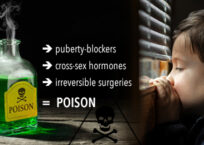
We know why transgenderism is morally wrong. We know how it physically and mentally scars those who fall into its trap.
However, most of us don’t know how deep and dark the physical and mental trauma surrounding transgenderism is.
Prisha Mosley is a 26-year-old detransitioner. She went on Riley Gaines’ podcast, Gaines for Girls, to share her story. Click here to listen to it. Please note, Mosley talks about or mentions sexual assault, miscarriage, self-harm, suicide attempts, eating disorders, intense medical issues and being unable to bond with her newborn.
The interview can be hard to listen to, but it paints a clear picture of the spiritual darkness believers are fighting against. We need to understand the strongholds and deception those struggling with this are entrenched in. This past summer, my co-host Jenna and I hosted round-table discussions with a group of detransitioners on our podcast Self-Evident (which you can watch here and here).
A common theme was trauma, including sexual assault and self-hatred. Transitioning was presented as a ‘savior’ that would take away their pain and fix their problems.
In her interview, Mosley told Gaines she struggled with a severe eating disorder and suicidal ideation. She’d been sexually assaulted, which resulted in a miscarriage at age 14. Mosley believed if she could just get to the next goal weight, she’d be fine, but the goal weights kept getting lower. Her doctors pushed against her delusion, telling her the truth: she wasn’t fat, and she was going to kill herself if she didn’t start eating.
Mosley was so stuck in this mindset, she didn’t believe her doctors and turned to Tumblr to vent her frustration. On Tumblr, Mosley found a community of people who also struggled with eating disorders. Only this community affirmed her delusion instead of pushing back against it and then told her she might actually be a boy.
To her, this offered a bit of hope amidst all the darkness. It offered a reason for her suffering and a way out.
“It makes you feel less alone. It’s nice to not be told you’re crazy or it’s your fault, and if you were just born in the wrong body, in a similar way, that’s not your fault either, you know, and you can get help,” said Mosley.
When she told her doctors, they immediately affirmed her and started treatments.
“It felt nice as a very hurt and angry teenager to get my way,” Mosley said. “It was hurtful for years to hear ‘no you’re not fat.’…when my doctors just jumped on the train and agreed that I was born in the wrong body and started giving me information and medicalizing me, that you know, wow, I was going to get better now. I wasn’t being fought anymore. We were on the same page, and I was going to get healthy and want to live.”
Eventually, however, the pain from the treatments became too great, and the lie revealed itself. Transitioning didn’t bring Mosley any relief, and she realized her girl body would never become a boy’s body. She detransitioned and now lives with chronic pain and constant medical issues because of her attempt to transition.
For Mosley, transgenderism presented itself as a ‘savior’ – something that would take away the pain she was experiencing, transform her life and fix her problems. She’s not the only detransitioner who saw transgenderism as a savior. Many others believe their life would be better if only they could become the other gender.
But it doesn’t work.
Transgenderism offers a false salvation, exploiting pain and wreaking havoc on those made in the image of God. True hope and a genuine way out for those struggling so intensely with their mental health is only found through Christ.
If you find yourself struggling, don’t do it alone. Visit the Biblical Counseling Center for more resources.
























